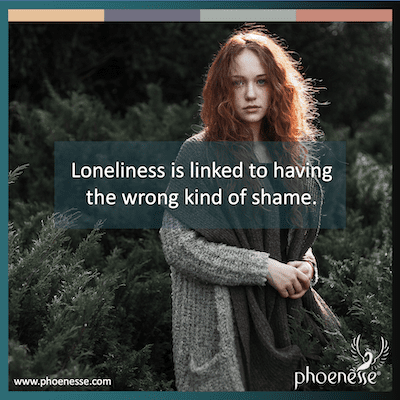
Loneliness is linked to having the wrong kind of shame.
One of the most effective motivators for doing the work of self-development—for purifying ourselves—is feeling badly about something. We want to make things right, to atone for messing up. Underneath this is a feeling of shame, which propels us to go in a positive direction. Without this inner push, we’d remain stuck. This right kind of shame, then, is constructive. Necessary even.
There’s another kind of shame though that is wholly destructive. This kind whispers in our ear: “I am bad, hopelessly bad. And there is nothing that can be done about it.” Such an attitude makes us wallow in self-pity while sluggishness keeps us from doing anything to correct that which is actually, in fact, wrong inside us.
Fettered with this wrong kind of shame, we demand and expect love and respect, even though we don’t love and respect ourselves. When we don’t get it, we see the world as unjust, rather than seeing that we are being unreasonable. When this happens, the real root of our problem isn’t that we have shortcomings, but that we harbor these feelings of unhelpful shame, which cause us to be passive exactly where we need to be active.
We’re all at risk for getting mired in the wrong kind of shame.
Around and around we go, caught in a vicious circle. First, we deny ourselves the experience of the constructive kind of shame that would lift us up to work on ourselves. Then, instead of being realistic in recognizing and addressing our shortcomings—the basis for self-development—we despise ourselves. The more we do this, the more we demand love and respect from others, hoping that will make up for our lack of self-respect.
This is where so many of us get stuck. We’re operating out of blindness, letting the unconscious, immature side of us run the show. Yes, we’ve all got weaknesses that we need to look at and work on, and no, not everyone is expected to do the same work; we’ve each come with different tasks depending on what will serve us best in our overall spiritual development.
Yet we’re all at risk for getting mired in the wrong kind of shame that deflates us, instead of embracing the right kind of shame that can inspire us. Just switching over to the right kind of shame provides us with a much-needed shot in the arm of self-respect. This happens even before we’ve made any headway on our faults.
The right kind of shame holds the key
Where does the wrong kind of shame come from? It stems from our pride, and it perpetuates even more pride. This is a paradox that needs some explanation. Pride—along with fear and self-will—is one of the three primary factors we all need to reckon with if we want to take on our Lower Self and change our current less-than-satisfying reality.
Trouble is, wrapped up in the wrong kind of shame, we attempt to escape reality by not accepting ourselves as we currently are. We sink into despair, feeling hopeless about our lower nature, and lack the humility to face ourselves with courage. This friends, is essentially what pride is. We want to be better than we are and won’t face everything about our present selves, flaws and all. Due to our pride, we are looking for an easy escape.
In our minds, we may get that we’re not perfect. But emotionally, it’s another matter. The gap between what we think we know and what our emotions display is often enormous. With careful attention, though, we can make our emotions conscious and translate them into clear thoughts. It just takes a little mindful effort. Too often, we give ourselves far more credit than our minimal efforts warrant. We like to claim perfection in our emotions before they’ve had a chance to mature.
Rather than slowly making our way forward, we get mad at the world and at ourselves for still being where we are. Then we refuse to make the effort needed to get to where we desire to be. So all told, our shame is a bundle of pride, laziness and perceived injustice, with a healthy dose of desire to escape our current life thrown in. If we feel mired in guilt, this is what is causing it, not the fact that we still have some faults to deal with.
We wouldn’t feel guilty if we’d adopt the right kind of shame, humbly accepting ourselves as we are right now and not fleeing from the situations our faults have created. If, step by step, we would slowly walk forward from wherever we are, we’d be on track to develop and change. We are then being both realistic and constructive.
Rather than slowly making our way forward, we get mad at the world and at ourselves for still being where we are.
Here’s what usually happens instead. Due to our pride and our demand that others love us and respect us, we hide what we really think and feel about ourselves behind a wall. Crouched behind this wall, we don’t think we can stand up for who we really are because then we won’t be liked. And since we don’t respect ourselves, it becomes more and more important that others provide this for us. So we create a fake version of ourselves for them to respect.
Now that we act like a fake, we despise ourselves even more. We become despondent, as this vicious circle keeps grinding away. And this will continue until we find the inner courage to make a different choice. Doing so doesn’t mean we give in to our Lower Self. Rather, we recognize and accept that this is where we are, without trying to fix a better personality in place for the world to see, to make us seem better than we are. This is how we start to find out who we really are, underneath the fake version we’ve been parading around for so long.
The litmus test for where we are on this journey is this: As long as seeing our faults makes us feel bitter, defiant, sad or somehow out of sorts, we are not yet accepting ourselves as we are. Our work then is to search for the middle path. Because accepting ourselves as we are is not to say we want to stay in this imperfect state forever.
Further, we need to look for where we may hope to be cherished for our shortcomings. We sometimes do this to compensate for the fact that we don’t think we can change and therefore come to truly cherish ourselves. Once we can bring such unreasonable emotions to the surface, it’s not all that hard to redirect them into more productive channels.
Take heart, friends. By really and truly accepting ourselves as we are, not hoping to appear better than we currently are, we have met the requirements for being on this spiritual path. Up until then, we’re approaching the gate, but haven’t yet entered. Having the wrong kind of shame, then, is like a lock on the gate, and the key is to embrace the right kind of shame.
Breaking down our walls of shame
If we’re feeling lonely and misunderstood, chances are good the problem is not really lack of love and understanding from other people. Regardless how incapable those around are of loving us, that wouldn’t make us feel lonely if the wrong kind of shame wasn’t filling our sails. So we can’t hope to turn things around us by getting others to do better. Instead, we must turn around and look inside ourselves, from this point of view.
Perhaps we’ll discover there’s something making us feel ashamed. The point isn’t whether it’s big or small, life altering or insignificant; the point is whether we’re trying to cover it up, to hide it. If we are, then here’s that wall, attempting to make us appear whole without others eye-spying the thing we’re ashamed of. But bad news: now, in fact, there is a wall separating us from others.
When we have the courage to stumble a thousand times over the same fault, and yet keep lifting ourselves up to try again, we are truly on this path.
With this wall in place, we can never be sure if we are really loved and appreciated. For inside, this little voice whispers incessantly, “If they only knew who I really am, or what I have done, they wouldn’t love me.” This is what makes us feel lonely. It cuts us off from others and ourselves, causing us to suffer and feel cold.
Any affection coming our way, we think, is destined for the fake version we present, and not for the person we really are. Of course we’re lonely and insecure in such a state. But there’s not a soul on earth who can change this, other than us.
The way out? We must resolve our growing self-hatred and insecurity. But how? Sorry to say, we will need to take the one step that seems harder than anything else: We must break down our walls of shame and stand up for who we really are. For the more we keep going in the direction we’ve been going, the deeper our dilemma will be.
Does this mean we should start telling all our secrets to everyone we meet? Not at all. We will want to use discernment in choosing the right person to open up to. We begin with those who can help us, and then broaden to choosing people we are close to. If we’re not willing to do this, we can never hope to be ourselves and truly respect ourselves.
As we stop deceiving and escaping ourselves and stop hiding behind a wall of make-believe, this does not mean we now start beating ourselves up. Rather, in a positive way, we simply take stock of what we find and work toward change. This won’t happen in one fell swoop. Time and again, we’ll need to recognize our deeply ingrained faults, and with learned humility, continue to reach to do better.
Know that the minute we stop wanting to appear better than we are, even to ourselves, we will have come down from our lofty perch. Now we’re ready to start rebuilding. When we have the courage to stumble a thousand times over the same fault, and yet keep lifting ourselves up to try again, we are repaying God what we owe and we become worthy of God’s grace. Then we are truly on this path.
If our faults were easy to overcome, doing so would likely make us become even prouder than we already are.
That’s how we rid ourselves of pride, long before we’re perfect in the many details of our personality. This is how we win at life. But when we stumble over a stubborn fault and fall into despair, wishing to give up and seeing self-acceptance as a nuisance, then the wrong kind of shame is winning and we will not get anywhere. Succumbing to despair is a sure sign we’ve got way too much pride.
If our faults were easy to overcome, doing so would likely make us become even prouder than we already are. And make no mistake, pride is a very harmful fault. No, overcoming faults isn’t a picnic for anyone. Consider too that the faults we’re battling are deeply ingrained; they’ve been with us for many incarnations. Most won’t dissolve in a day, a month, or even a year.
But if we face them head-on, with eyes wide open, learning each time we trip and stumble over them, and if we set our sights on progress, knowing where we truly belong—not too high, and not too low—then we’re laying a solid foundation for a healthy inner attitude, even while we’re still imperfect people.
Leaning into the Law of Brotherhood and Sisterhood
Why, you may ask, must I share my faults with someone else? Isn’t it enough that God knows? No, it’s not, and here’s why. When we talk openly with a qualified person, and then go on to share with people who are close to us, we open a pathway for light. But as long as we keep our darkest secrets hidden away, everything becomes unwittingly distorted. We blow up one thing and overlook something else.
But when we articulate our less-than-shiny inner bits to someone who is not attached like we are to our struggle, they may see things in their right light. There’s a spiritual law at work here, which applies the same in therapy as it does in confession; it’s called the Law of Brotherhood and Sisterhood.
Showing ourselves to one person as we truly are brings the relief our soul has been crying for.
The moment we open up and share honestly with someone, we are performing an act of humility. We are taking a risk, and at that moment, we aren’t trying to appear more perfect than we are. When we do this, showing ourselves to one person as we truly are, we instantly feel the relief our soul has been crying for, even if that person doesn’t offer us a single word of advice.
When we act against this law, withholding ourselves behind an inner wall, our spirit suffers. But when we humbly reveal ourselves, we feel better all of a sudden. This is how the Law of Brotherhood and Sisterhood works. And while the Spirit World works behind the scenes to guide us to the ones we can share our secrets with, no one can do the talking for us. With our free will, it’s our choice to open up or to retire deeper into our corner where we resent being pushed.
It’s always our choice to take a step toward the light, coming out of our hiding place and opening our eyes as well as our mouth. This is the only way to see that such a path leads to freedom. It’s time to decide: Am I ready to uncover what I have been blind to? Am I ready to face myself? Am I willing to be in truth? How humble am I, really?
Falling out of love with our faults
It’s true, we are often ashamed of our faults; we wish we didn’t have them. But sometimes we have faults we’ve fallen in love with, which explains why we remain stuck for so long. In fact, sometimes we’re quite proud of our faults. When this happens, we need to ask for help in figuring out what lies behind our emotional attachment to our faults. We’re going to need to pray, asking to see our fault in such a way that we develop the right kind of shame about it.
When we find a fault that we cherish in an odd sort of way, we can ask: “How would I like it if someone else had this same fault?” Most often, we’ll find we’re highly irritated when we come across our precious fault in anyone else. Seeing things from this perspective might knock off some of the pride we’ve attached to our favorite fault. For as long as pride persists, we’re dead in the water on overcoming this shortcoming.
Every single fault or imperfection we have is a direct impediment to love. And whatever stops love, also blocks God. Yet inside every fault lies a heart of gold, as there is not a fault on Earth that is not a distortion of something originally good and pure. It’s on us to do the work of transforming all our negative qualities back to their divine loving nature.
—The Guide’s wisdom in Jill Loree’s words

We Can Heal | After the Ego • Blinded by Fear
Real. Clear. series | Holy Moly • Finding Gold • Bible Me This • The Pull • Pearls • Gems • Bones • Nutshells
All essays | Get a Better Boat • Living Light • Latest essays
Self. Care. series | Spilling the Script • Healing the Hurt • Doing the Work
More books | Walker • Word for Word • Spiritual Laws • Keywords



